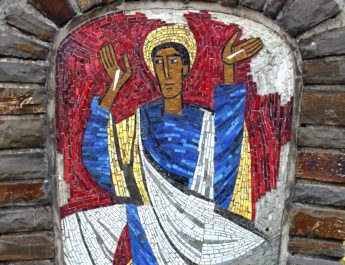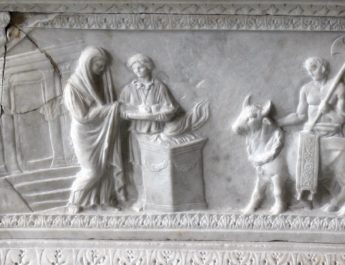Luke 23:33-34a, 46
Narrative Lectionary 341
33 When they came to the placeA that is calledB The Skull,C they crucifiedD Jesus there with the criminals,E
A “place” = topos. This is a place or region. It is a smaller space that can only hold a limited number of people whereas chora is a larger place. Figuratively it could be an opportunity.
B “called” = kaleo. Related to keleuo (to command, order, direct); from kelomai (to urge on). This is to call by name, invite, to name, bid, summon, call aloud.
C “Skull” = kranion. 4x in NT. From kara (the head) OR from the base of keras (horn or something horn-shaped; horn in a literal or figurative sense – that which prevails or a symbol of power). This is skull. It’s where we get the word “cranium” from.
D “crucified” = stauroo. From stauros (upright stake, cross; literally the horizontal beam of a Roman cross, generally carried by the one convicted to die); from the same as histemi (to stand, cause to stand). This can be to attach someone to a cross or fencing with stakes. In a figurative sense, it could be to destroy, mortify, or subdue passions/selfishness.
E “criminals” = kakourgos. 4x in NT– 3x of those crucified with Jesus in Luke 23 & 1x of the author of 2 Timothy being chained like a criminal (2:9). From kakos (bad, evil, harm, ill; evil that is part of someone’s core character – intrinsic, rotted, worthless, depraved, causing harm; deep inner malice that comes from a rotten character; can be contrasted with the Greek poneros, which is that which bears pain – a focus on the miseries and pains that come with evil; also contrasting the Greek sapros, which deals with falling away from a previously embodied virtue) + the same as ergon (word, task, action, employment);{from ergo (to work, accomplish) or from erdo (to do)}. This is literally wrongdoer – a criminal, someone who does evil.
oneF on his rightG and one on his left.H
F {untranslated} = men. This is truly, indeed, even, in fact. Often, it is not translated, but used to emphasize affirmation.
G “right” = dexios. Perhaps from dechomai (to warmly receive, be ready for what is offered, take, accept, or welcome; to receive in a literal or figurative sense). This is right, right side, or the right hand.
H “left” = aristeros. 4x in NT. From aristos (best). This is better, used figuratively to refer to the left or left hand side.
34 Then JesusI said, “Father, forgiveJ them; for they do not knowK what they are doing.”L
I “Jesus” = Iesous. From Hebrew Yehoshua (Joshua, the Lord is salvation); {from YHVH (proper name of the God of Israel; the self-existent and eternal one); {from havah (to become) or from hayah (to come to pass, become, be)} + yasha (to deliver, defend, help, preserve, rescue; properly, to be open, wide or free, which implies being safe. So, in a causative sense, this is to free someone)}. This is Jesus or Joshua in Greek – the Lord saves or the Lord is salvation.
J “forgive” = aphiemi. From apo (from, away from) + hiemi (to send). This is send away, release, permit, forgive, allow to depart, discharge, or send forth.
K “know” = eido. This is to know, consider perceive, appreciate, behold, or remember. It means seeing with one’s eyes, but also figuratively, it means perceiving – seeing that becomes understanding. So, by implication, this means knowing or being aware.
L “doing” = poieo. This is to make, do, act, construct, abide, or cause.
And they castM lotsN to divideO his clothing.P
M “cast” = ballo. This is to throw, cast, rush, place, or drop. It is throwing, but it could be with more or less velocity and with more or less force/violence.
N “lots” = kleros. 12x in NT. Perhaps from klero (casting a lot) or from klao (to break in pieces as one breaks bread). This lot, portion, heritage. It is that share assigned to you. It could also refer to a lot used to determine something by fate, chance, or divine will.
O “divide” = diamerizo. 12x in NT. From dia (through, across to the other side, thoroughly) + merizo (to divide, part, share, distribute, assign; figuratively, to differ); {from meros (part, share, portion figurative or literal); from meiromai (to get your share, receive one’s allotment)}. This is to divide up, distribute, or share. Figuratively, it can mean dissension.
P “clothing” = himation. From heima (garment) OR from ennumi (to put on). This is the outer garment, cloak, robe, or mantle. It is worn loosely over a tunic.
46 Then Jesus, cryingQ with a loud voice,R said, “Father, into your handsS I commendT my spirit.”U Having said this, he breathed his last.V
Q “crying” = phoneo. From phone (voice, sound, tone or noise; also a language or dialect); probably from phemi to declare, say, use contrasts in speaking to shed light on one point of view); {from phao (to shine) or phaino (to bring light, cause to appear, shine, become visible or clear). This is to call out, summon, shout, address. It is making a sound whether of an animal, a person, or an instrument.
R “voice” = phone. Related to “crying” in v46. See note Q above.
S “hands” = cheir. This is the hand in a literal sense. Figuratively, the hand is the means a person uses to accomplish things so it can also mean power, means, or instrument.
T “commend” = paratithemi. 19x in NT. From para (by, beside, in the presence of) + tithemi (to put, place, set, fix, establish in a literal or figurative sense; properly, this is placing something in a passive or horizontal position). This is properly, to se beside or place before. So, it can mean to set or serve a meal, to deposit something with someone, to set forth an argument. It can also mean to entrust, commend, or tell a parable (as setting forth information).
U “spirit” = pneuma. From pneo (to blow, breath, breathe hard). This is wind, breath, or ghost. A breeze or a blast or air, a breath. Figuratively used for a spirit, the human soul or part of us that is rational. It is also used supernaturally for angels, demons, God, and the Holy Spirit. This is where pneumonia comes from.
V “breathed his last” = ekpeneuo. Related to “spirit” in v46. 3x in NT. From ek (from, from out of) + pneo (see note U above). This is to exhale – figuratively, to expire.
Image credit: “At the cross I bow my knee, where Your blood was shed for me” by Demi-Brooke, 2009.




